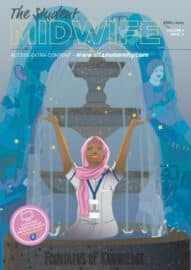Providing Accessible Healthcare for Autistic Women
Karen Henry – Midwifery Lecturer, The University of Suffolk and Ipswich Hospital, East Suffolk and North Essex NHS Foundation Trust
Twitter @Karenhenry1012
Introduction
 This blog accompanies an article with the same title which I have written around ideas to enhance maternity care for autistic women. (Published in The Practising Midwife journal February 2023 issue).
This blog accompanies an article with the same title which I have written around ideas to enhance maternity care for autistic women. (Published in The Practising Midwife journal February 2023 issue).
Current narratives say autistic women felt isolated, neglected, stigmatised and judged when engaging in maternity care. They felt hospital environments were sensory overloading and caused barriers to accessing care.
With support from the Florence Nightingale Foundation, I created a series of support plans to enable care adjustment ideas to flow between women and midwives to lower barriers and change future narratives for autistic women.
Estimated autism prevalence in the UK
Estimations place the number of autistic people in the UK to be around 1-2% of the population (around 700,000) however, this figure is much higher as many girls remain undiagnosed. This is due to male orientated diagnostic tools which were built upon autistic male characteristics and behaviour presentations.1
Undiagnosed autistic women
Such undiagnosed, mainly female autists remain hidden through masking or camouflaging their autism as they learn to imitate gestures, body language and use pre-prepared scripts to fit in with others,2 despite these being difficult skills to maintain. For undiagnosed women who go on to become mothers, one in five of those with autistic children will be diagnosed themselves in adulthood.3 This is where we as midwives intersect in the story because autistic women, regardless of when they are diagnosed and recognised, are accessing maternity care.
How autistic women experience maternity care
Current narratives by autistic women describe their pregnancy, birth and postnatal experience as poor. When adapting to motherhood, autistic women feel isolated, neglected, stigmatised and judged.4 They feel they needed to compare themselves to other mothers, so their parenting ability was not questioned.
However, masking led to feelings of inadequacy, depression and loneliness. In clinic and hospital environments, women experienced sensory overload from the different noises, smells, lights, disruptions and the sheer amount of people which caused them to feel disabled and unable to process information.5,6,7,8
For many autistic women the perinatal period can be filled with a fear of losing their children because many of them are referred to social services under the guise of them not being able to care for their babies.3,4,9
This leads many women to decide not disclose their autistic status, meaning they are denied the chance of accessing essential support for their mental wellbeing and transition to motherhood.4
Even when women do tell maternity staff they are autistic, they feel unsupported and misunderstood, possibly because they appear less disabled than they are.10 This means that communication from midwives can be vague, and procedures are not explained in a way that autistic people can understand.11,12
Reasonable adjustments
Autistic women felt happier when they had continuity of care from a midwife who could tailor care around their communication and sensory needs, who did not presume them to be of poor intellect function based solely on their autistic status.13 However, most autistic women are not offered reasonable adjustments due to poor staff autism knowledge14 which, has been acknowledged by health professionals themselves.15
Today, much of the training professionals receive is based around information gleaned from studies based on male participants and stigmatising assumptions that all autistic people struggle in all situations, which is simply not true. Autistic people may struggle with the changes that pregnancy brings not only to their physiology but also to their daily routines and the new environments they now engage in, such as clinics and hospitals.
Why this subject is important to me
I was excited to write an article for The Practising Midwife journal to share the communication/support plans I made a few years ago to support the small changes we can make to the environment to enable accessible care for women.
My passion for sharing this knowledge and improving maternity services for autistic women stems from me being an autistic woman, a midwife and a mother of an autistic daughter who may access maternity care at some point.
I feel that midwifery is not just a job, it’s our identity which is modelled around kindness and wanting to provide excellent support and care to women. We have the potential to change future maternity care experiences for autistic women when we are armed with knowledge of the difficulties some autistic women may face when accessing maternity care and the practical things that may make a difference.
Conclusion
I hope the information I wrote for the article goes some way to initiate collaborative working between autistic women and the healthcare professionals supporting them. I also hope through using the support plans as a prompt, appointments are more accessible for autistic women which, may in turn reduce some of the anxiety and stress caused by being in clinical hospital environments.
References
- Loomes R, Hull L, Mandy W. What is the male-to-female ratio in autism spectrum disorder? A systematic review and meta-analysis. J Am Academy Child Adolesc Psychiatry. 2017;56(6):466-74.
- Lai MC, Lombardo MV, Ruigrok ANV, et al. MRC AIMS Consortium. Quantifying and exploring camouflaging in men and women with autism. 2017;21(6):690-702. doi.org/10.1177/1362361316671012.
- Hill A. Mothers with Autism: I mothered my children in a very different way The Guardian. https://www.theguardian.com/lifeandstyle/2017/apr/15/women-autistic-mothers-undiagnosed-children. Published April 15, 2017. Accessed August 10, 2021.
- Pohl AL, Crockford SK, Blakemore M, Alison C, Baron-Cohen S. A comparative study of autistic and non-autistic women’s experience of motherhood. Mol Autism. 2020:6;11(1):3 org/10.1186/s13229-019-0304-2.
- Burton T. Exploring the experiences of pregnancy, birth and parenting of mothers with autism spectrum disorder. https://core.ac.uk/download/pdf/46568890.pdf. Published April, 2016. Accessed August 10, 2021.
- Gardner M, Suplee PD, Bloch J, Lecks K. Exploratory study of childbearing experiences of women with Asperger syndrome. Nurs Womens Health. 2016;20(1):28-37. org/10.1016/j.nwh.2015.12.001.
- Grant L. From Here to Maternity: Pregnancy and Motherhood on the Autism Spectrum. London: Jessica Kingsley Publishers; 2015.
- Hendrickx S. Women and girls with autism spectrum disorder: Understanding Life Experiences from Early Childhood to Old Age. London: Jessica Kingsley Publishers; 2015.
- Höglund B, Larsson M. Midwives’ Comprehension of Care for Women with Intellectual Disability during Pregnancy and Childbirth: An Open-Ended Questionnaire Study in Sweden. Women Birth. 2015;28(3):57-62. org/10.1016/j.wombi.2015.03.002.
- Blakemore M. Autism, Pregnancy and Motherhood: Special report says women overcome systemic abuse to become great mums. https://www.amaze.org.au/2017/09/autism-pregnancy-and-motherhood-special-report-tackles-systemic-abuse/. Published September 14, 2017. Accessed August 15, 2021.
- Malouf R, Henderson J, Redshaw M. Access and quality of maternity care for disabled women during pregnancy, birth, and the postnatal period in England: data from a national survey. BMJ Open. 2017:7:e016757. org/10.1136/bmjopen-2017-016757.
- Redshaw M, Malouf R, Gao H, Gray R. Women with Disability: The Experience of Maternity Care During Pregnancy, Labour and Birth and the Postnatal Period. BMC Pregnancy Childbirth. 2013;13(1):174. https://doi.org/10.1186/1471-2393-13-174.
- Rogers C, Lepherd L, Ganguly R, Jacob-Rogers S. Perinatal issues for women with high functioning autism spectrum. Women Birth. 2017;30(2):89-95. org/10.1016/j.wombi.2016.09.009.
- Hampton S. Autistic mothers and the perinatal period: maternal experiences and infant development. D. The University of Cambridge. Published 2020. Accessed October 01, 2021. https://doi.org/10.17863/CAM.71112.
- Morris R, Greenblatt A, Saini M. Healthcare providers’ experiences of autism: A scoping review. J Autism Dev Disord. 2019;49(6):2374-2388. org/10.1007/s10803-019-03912-6.








